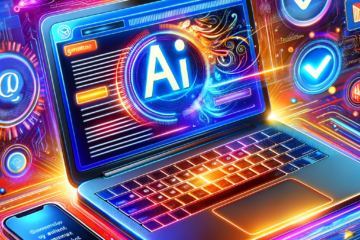For recruiters, the adoption of AI is not just a trend; it’s a change. As we navigate through this transformation, it’s essential to understand how AI is reshaping recruitment and what it means for the future of hiring
Let’s understand how AI is helping recruiters streamline their hiring process.
Artificial intelligence has moved beyond being a buzzword in recruitment. It has become a critical tool that enhances efficiency, improves candidate experience, and helps recruiters make more informed decisions. From automating repetitive tasks to providing insights through data analysis, AI is making the recruitment process smarter and faster.
3 areas where AI is helping recruiters
One of the most significant impacts of AI in recruitment is the automation of time-consuming tasks. Resume screening, candidate sourcing, and interview scheduling are just a few areas where AI-powered tools excel.
For instance, AI can quickly sift through thousands of resumes to identify the most qualified candidates based on specific criteria, a process that chief human resources officer executive search firms increasingly rely on for efficient talent acquisition. This not only saves time but also ensures a more objective selection process.
Moreover, AI-driven applicant tracking systems (ATS) are becoming indispensable. These systems, often referred to as the top applicant tracking systems, leverage AI to manage the recruitment workflow. They can track candidate interactions, analyze data to identify trends, and even predict future hiring needs. This level of sophistication was unthinkable just a few years ago, but today it’s a reality that recruiters can’t afford to ignore.
Providing exceptional candidate experience
Artificial Intelligence plays a crucial role in creating a seamless and personalized experience for candidates. Chatbots, for example, are increasingly being used to engage with candidates from the moment they apply.
These AI-powered assistants can answer queries, provide updates on application status, and even conduct initial screenings.
AI also enables more personalized communication. Using tools that analyze candidate data, recruiters can send tailored messages that resonate with individual candidates. For instance, leveraging AI to create optimized LinkedIn InMail templates can significantly increase response rates and engagement.
This level of personalization makes candidates feel valued and understood, which is essential for building a strong employer brand.
Helping in decision making
The rise of AI in recruitment is also about harnessing the power of data. AI algorithms can analyze vast amounts of data to uncover insights that would be impossible for humans to detect. This data-driven approach allows recruiters to make more informed decisions at every stage of the hiring process.
For example, predictive analytics can forecast which candidates are likely to be the best fit based on historical data. This goes beyond traditional metrics like education and experience, considering factors such as cultural fit and career trajectory.
Reducing bias in hiring
Bias in recruitment has been a long-standing issue. Traditional hiring practices often inadvertently favor certain groups over others, leading to a lack of diversity.
AI has the potential to mitigate this problem by providing a more objective evaluation of candidates.
AI-powered tools can be programmed to ignore irrelevant factors such as gender, age, and ethnicity, focusing solely on qualifications and skills. This helps create a level playing field where candidates are assessed based on merit rather than unconscious biases. However, it’s crucial to ensure that the AI systems themselves are designed and trained in a way that avoids perpetuating existing biases
Interviewing and assessment
AI is also transforming the way interviews and assessments are conducted. Video interviewing platforms that use AI can analyze candidates’ speech patterns, facial expressions, and body language to assess their suitability for a role.
These platforms provide recruiters with additional data points that complement traditional interview methods.
Furthermore, AI-powered assessments can evaluate candidates’ skills through simulations and interactive tests. These assessments provide a more accurate measure of a candidate’s abilities than traditional methods, ensuring that only the most qualified individuals progress to the next stage of the hiring process.
Recruiters must also be vigilant about the ethical implications of using AI. Ensuring transparency in how AI decisions are made, maintaining candidate privacy, and continuously monitoring for bias are essential steps in the responsible use of AI in recruitment.
Predicting future hiring needs
AI’s predictive capabilities extend beyond immediate hiring decisions to anticipating future recruitment needs. By analyzing trends in hiring data, market conditions, and company growth projections, AI can help recruiters plan more strategically. This proactive approach ensures that organizations are better prepared for workforce changes and can maintain a steady talent pipeline.
Predictive analytics can identify which roles are likely to experience turnover or increased demand, allowing recruiters to prioritize these positions. This foresight helps in creating targeted recruitment campaigns and reduces the time-to-hire for critical roles, ultimately supporting the organization’s long-term goals.
Improving employee retention
AI doesn’t just help with hiring; it also plays a significant role in retaining top talent. By analyzing employee data, AI can identify patterns and predictors of employee turnover. This allows HR teams to intervene early, addressing issues that may lead to resignations.
For instance, AI can monitor employee engagement levels, performance metrics, and feedback to pinpoint areas of concern. Based on these insights, HR can implement targeted retention strategies, such as personalized career development plans or employee wellness programs.
This proactive approach helps in maintaining a satisfied and committed workforce, reducing the costs and disruptions associated with high turnover rates.
What is the future of recruitment with AI?
The integration of AI in recruitment is still in its early stages, and its potential is vast. As AI technology continues to advance, we can expect even more innovative solutions that will further streamline the hiring process and improve outcomes.
One area of future development is the use of AI in employee retention and internal mobility. AI can help identify employees who are at risk of leaving and suggest interventions to retain them. It can also assist in finding internal candidates for open positions, ensuring that the organization makes the best use of its existing talent.
Use of AI in recruitment is not just a trend; it’s a force that is changing the way we hire. By automating repetitive tasks, enhancing candidate experience, enabling data-driven decision-making, and reducing bias, AI is helping recruiters become more efficient and effective. However, it’s essential to balance the use of AI with the human touch and ethical considerations to ensure that the recruitment process remains fair and transparent.




